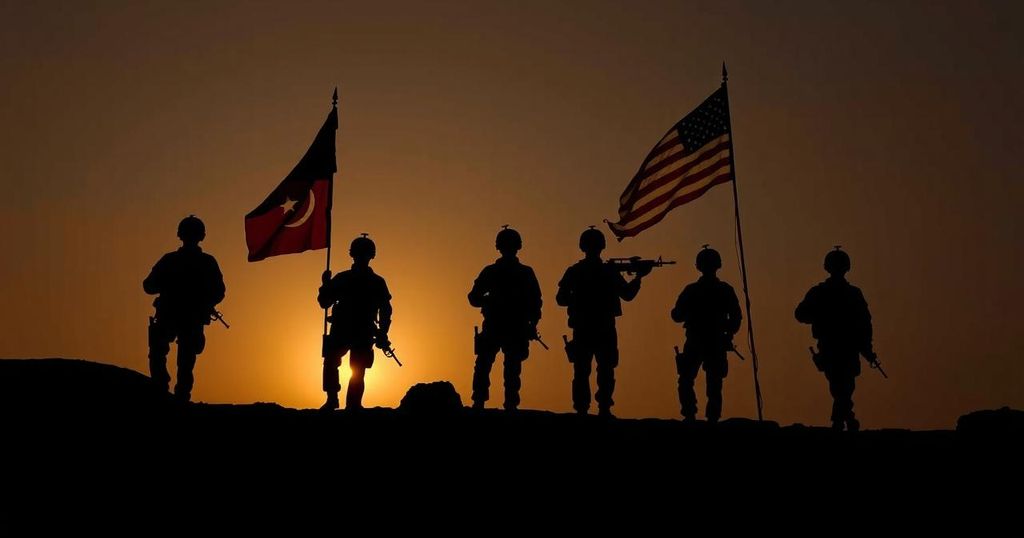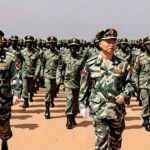U.S. General Confirms Redeployment of Special Forces to Chad
The U.S. is redeploying Special Forces troops to Chad after a five-month withdrawal, following a decision by President Mahamat Deby. Major General Kenneth Ekman emphasizes the importance of Chad’s strategy against violent extremism amid shifting geopolitical dynamics in West Africa, particularly after coups in Niger and other countries that have affected U.S. operations.
The United States has announced the return of a limited number of Special Forces troops to Chad after their withdrawal five months ago at the request of Chadian authorities. Major General Kenneth Ekman, who oversaw the recent U.S. military withdrawal from Niger by orders from U.S. Africa Command chief General Michael Langley, stated in an exclusive interview with VOA that the decision to redeploy U.S. forces was made by Chadian President Mahamat Deby. Following his victory in the April presidential election, President Deby has agreed to permit the return of U.S. forces, putting forth a new cooperative framework that contrasts with the previous situation in Niger. A significantly smaller operational footprint is anticipated compared to the earlier U.S. military headquarters established in Chad. This decision aligns with ongoing efforts to combat the rising threats posed by Boko Haram and Islamic State militants in the region surrounding Lake Chad, as part of a broader strategy concerning counterterrorism operations in West Africa. Major General Ekman underscored the importance of Chad’s strategy in addressing threats from Violent Extremist Organizations (VEO), especially after the U.S. military’s withdrawal from Niger, which officially concluded their engagement in the country. The leadership of U.S. Africa Command is currently recalibrating its military strategy regarding the region, following substantial changes caused by recent coups in Niger, Burkina Faso, and Mali, which have affected the availability of local bases for counterterrorism operations. Currently, countries such as Ivory Coast, Nigeria, Ghana, and Benin are becoming increasingly influential in shaping U.S. military strategy in West Africa. It has been reported that while Ghana and Nigeria have expressed disinterest in hosting U.S. forces, some countries along the coast are actively seeking to enhance security cooperation with the U.S. as the militant threat grows. The U.S. military is exploring refurbishment possibilities for bases, notably in Benin, to support operations against militant activities. However, any significant military presence akin to previous installations in Niger would ultimately hinge on policy decisions from U.S. leadership. Amid uncertainties regarding counterterror operations, Major General Ekman emphasized that the recent military withdrawal from Niger has obstructed the U.S. ability to effectively monitor growing extremist threats in West Africa, describing the current situation as noticeably “more opaque.” This reduction in access has led to concerns that U.S. partnerships are diminishing, alongside a notable rise in extremist violence since the coup in Niger. He remarked on the necessity for the U.S. to explore various approaches for collaboration, emphasizing that shared security objectives should continue to guide future interactions between the U.S. and Chad, even in the absence of a direct military presence.
The United States’ decision to redeploy Special Forces to Chad comes in the context of recent political turmoil and military withdrawals from neighboring Niger, where coups have disrupted U.S. counterterror operations. With escalating threats from groups like Boko Haram and the Islamic State in the Sahel region, the U.S. military strategy is shifting towards strengthening partnerships with other West African nations that express a willingness to cooperate against extremist threats. This is part of a broader re-evaluation of U.S. military presence in West Africa following political changes that have limited access to key bases in the region.
The U.S. military’s return of Special Forces to Chad signifies a strategic adjustment in response to evolving security dynamics in West Africa. With the increasing threat from militant organizations and deteriorating relationships in the region, it remains to be seen how the U.S. will navigate these challenges while maintaining essential counterterrorism capabilities. The situation highlights the intricate balance between military presence and cooperative security efforts among West African nations as the U.S. assesses its role in combating terrorism on the continent.
Original Source: www.voanews.com








Post Comment